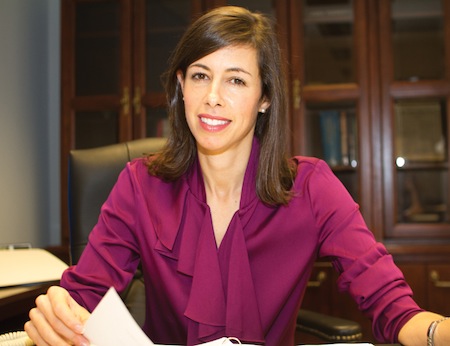Rosenworcel Gets Thorough Re-vetting In Senate

The smarter way to stay on top of broadcasting and cable industry. Sign up below
You are now subscribed
Your newsletter sign-up was successful
FCC Democratic commissioner Jessica Rosenworcel was prepared, and needed to be, as she fielded a host of questions at her renomination hearing in the Senate Commerce Committee Wednesday.
The senators were generally cordial but pressed her on issue after issue, for which the commissioner had answers at the ready.
In fact, Sen. Amy Klobuchar (D-Minn.) explicitly praised Rosenworcel's preparation for the hearing and her ability to provide facts and figures, on everything from connected cars to broadband in schools—without notes.
Commerce chairman John Thune (R-S.D.) opened the hearing by talking about the Democratic majority's "polarizing" vote along party lines to "burden" the Internet with Title II regulation, while ranking member Brian Schatz (D-Hawaii) said he had helped the FCC take a light-touch approach that had spurred innovation.
Sen. Bill Nelson (D-Fla.), ranking member of the Communications Subcommittee, praised FCC chairman Tom Wheeler for his cooperation as they explore a legislative solution to the FCC's net neutrality authority, and Thune added that he hoped for that solution as well.
Rosenworcel faced questions from the Senate panel on FCC reform, broadcast incentive auctions, network neutrality, wireless spectrum, unlicensed spectrum, broadband subsidies, broadband speeds, broadband adoption, schools and library access, call completion, Universal Service Fund contribution reform, community broadband, connected cars, dig-once broadband deployment, and more.
Rosenworcel defended her decision to support Title II and limits on TV joint sales agreements; said the FCC needed to collect fines from Lifeline subsidy providers cited by the FCC for violations, but said that needed to happen without cutting off subs who need phone service; and said broadcasters should not be unduly burdened in repack of stations after auction, and if there is not enough money to compensate all the broadcasters who are moved, the FCC should go back to Congress, which capped the payment.
The smarter way to stay on top of broadcasting and cable industry. Sign up below
“The TracFone “fine” isn’t a fine," said a company spokesperson following the hearing questions about Lifline fines going unpaid. "It hasn’t been paid because it hasn’t been imposed. In September 2013, TracFone received a notice of apparent liability that proposed a fine. Per FCC rules, TracFone filed a response in December 2013 in which it vigorously denied liability and asserted that the proposed fine was wildly disproportionate and contrary to decades of FCC forfeiture jurisprudence. The matter has remained pending and unacted on since. Unless and until the FCC issues an order imposing the fine, which was proposed in the notice of apparent liability, then no 'fine' has been imposed.”
Sen. Roy Blunt (R-Mo.) pointed out that as many as 1,000 TV stations may have to move after the auction and that it would cost twice as much as the estimates. He asked how the FCC was preparing for that repack and the cost.
She said some segment will need to relocate, but did not know the number because the FCC won't know that number until it gets into the auction. But she pointed out that Congress set aside $1.75 billion. She said it was important that that was enough to cover the relocation of every station. She said she thinks that amount will be adequate, but added: "If we find out that it is not, we'll have to come back to Congress and ask for your assistance."
Rosenworcel also gave a shout out to the Librarian of Congress for the decision this week to include tablets explicitly among the devices subject to mandatory unlocking.
The commissioner was asked about the value of reserving unlicensed spectrum in auctions, which the GAO has scored as providing no return to the treasury. She said that missed that point of the value to the economy of unlicensed, and encouraged all auctions to include an unlicensed dividend.
Asked about FCC process reforms, the commissioner said the commission could use more deadlines for action.
Asked how Congress could help with wireless deployment, she said the federal spectrum auction legislation recently proposed is a good start, but Congress needed to focus on a "steady and strong spectrum pipeline." She also said the ground matters as well as the air, which means helping ease deployment of towers and other facilities.
Democrats on the committee urged swift confirmation. That won’t' come for at least two weeks, since Thune kept the record open for that long so written questions could be submitted for Rosenworcel’s responses. She is not expected to have any trouble securing that confirmation vote in either the committee or full Senate.
The President renominated Rosenworcel for a new five-year term back in May. Her current term expired in June, but she could serve until the end of 2016 without renomination.
Also urging her swift confirmation for a second term was Chip Pickering, CEO of INCOMPAS (formerly COMTPEL), which represents competitive carriers.
“There are few leaders in Washington who possess the poise, wisdom and vision of Commissioner Jessica Rosenworcel. She is firmly focused on the future of education and the networks that will help bring the Internet to children and families across the nation," Pickering said.
Contributing editor John Eggerton has been an editor and/or writer on media regulation, legislation and policy for over four decades, including covering the FCC, FTC, Congress, the major media trade associations, and the federal courts. In addition to Multichannel News and Broadcasting + Cable, his work has appeared in Radio World, TV Technology, TV Fax, This Week in Consumer Electronics, Variety and the Encyclopedia Britannica.

